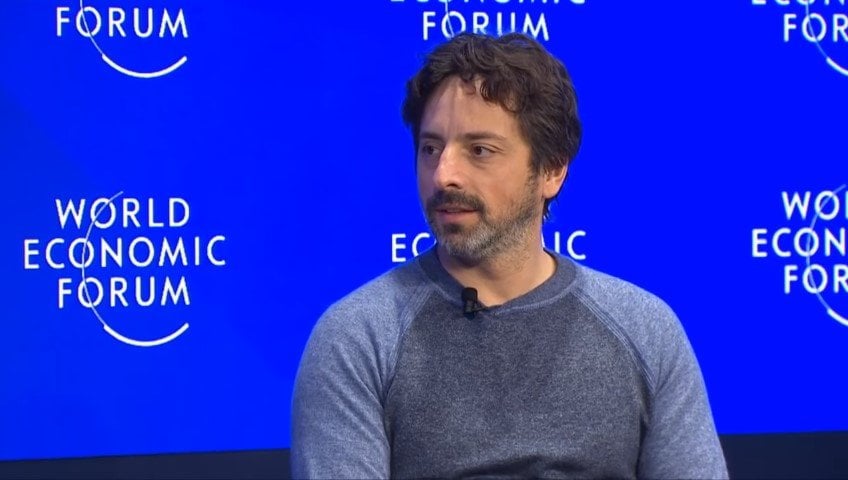In the first episode of our series looking back over the greatest conversations to take place at the World Economic Forum, we join Google co-founder Sergey Brin as he ponders success, failure and the importance of pursuing your passions. The interview, conducted by Forum Chairman Klaus Schwab, was first published on 19 January 2017.
Q1 hedge fund letters, conference, scoops etc, Also read Lear Capital: Financial Products You Should Avoid?
Sergey Brin: No Big Deal. Just Give It A Shot!
Transcript
Good afternoon. It's a very exciting session for me. I am I consider myself an entrepreneurial even if I'm a social entrepreneur. Working for the public good but to have on my side someone who is considered as one of the greatest entrepreneurs of our times. Ablin who is as you know knows the co-founder and president of Tibet. I think it's a unique opportunity to exchange some views. And I wonder which I should take my tie off or not. But let me let me go immediately into a separate trick. We talk a lot about The Fasi distribution and I have written a book. One year ago when I look at the contents I have a feeling such a lot is already outdated but was considered a year ago. Science fiction is already a reality. So maybe my first question to you is would to use these shoes and sit next fall and Ts to force and distribution. That's a fantastic question. First of all let me just. All of you. You may be should doubt my answer is a little bit. So when I was heading up Google X a few years back and one little project we had there which is now called Google Brain which was AI effort but I didn't pay attention to it at all to be perfectly honest and you know myself having been trained as a computer scientist in the 90s. Everybody knew hey I didn't work. It's not like you know people tried it. They tried neural nets. None of them worked out.
And this fellow who is you know one of our top computer scientists Jeff Dean would periodically come up with me and look for a computer made a picture of a cat and I say Okay that's very nice stuff. Go do your thing. Whatever. And fast forward a few years and now brain probably touches every single one of our main projects ranging from search to photos to ads to everything we do. And yet this kind of revolution in deep nuts has been very profound and definitely surprised me even though I was like right there sitting like I could throw you know paperclips at him. It's an incredible time and it's very hard to forecast. You know what can these things do. We don't really know the limits and in 100 years if we imagine ourselves you know that these can do kind of everything we can imagine and more. It's it's a hard thing to think through and has the really incredible possibilities. But it's I think it's impossible to forecast accurately. SERGUEI would you would you see all supposed to keep sight of course as an entrepreneur you have to see the positive side. But you see also possible risks and also those fancy if I may use his real world a new means which we really have a dollar disposal. I think it definitely requires some thought and an incredibly and I'm here at Davos and I'm just shocked at how I feel like the Luddite in the room. You know everybody's talking about well how do we cope with this increased automation here and the jobs displaced and so forth.
And you know I feel like the one like oh you know actually that's pretty hard to do with a computer and I kind of know what we're trying to accomplish to make that technology work. And I think a lot of folks here are I think correctly for thinking taking some of those innovations for granted and then saying whoa what does that mean for society and so forth. I think that's the right thing to do. I think thinking through sort of is the continuing of the automation that we've seen in the past 200 years and how that evolves society and economy and social order. That's the smart thing to do. I don't think it's sort of impossible somehow. But it deserves a lot of thought. You cannot say stop it. You can channel it. And that I want to follow up a little bit about sea level rise as we speak about the times now being let's say shaped by the digital revolution. Some people would say when we sit here again you came over ten years ago as one of our young global leaders for the first time here. When we sit again to guess what in 20 years we may. Much more to talk about the biological revolution and of course Sons is a combination of the biological and the digital evolution. Can you explain your thinking. Can you explain this. You're sinking in this respect particularly because I know you are very interested in Zen medical issues Zozo. Yeah. Well I think you can approach health from several levels and say well what are the specific things that we're the afflicted with whether it's you know heart health or cancer you know Parkinson's I'm personally passionate about. And you know look at the specifics of treatments.






